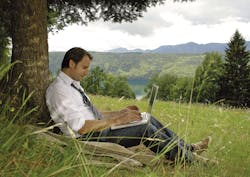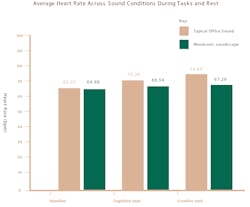Bringing Nature’s Sounds to the Workplace May Help
We’ve known for years that natural light and views of nature can profoundly benefit humans. A hypothesis called biophilia suggests that due to our evolutionary biology, people innately tend to seek connections with nature. Architects and designers have embraced this and created biophilic designs by visually incorporating the natural world into the built environment.
It turns out, though, that the biophilic hypothesis applies not just to sight, but to hearing as well. And while most of us feel our best when out in nature, we spend around 90% of our time indoors. Once inside, research shows that noise is the number one complaint and the most distracting problem in the workplace.
Because our ears evolved as our primary warning system, they are always on. In workplaces, a myriad of other peoples’ conversations, alerts and other sounds consume valuable cognitive resources, distracting team members and lowering focus and productivity. Noise, whether from traffic, air conditioning, or other sources, causes measurable stress responses, raising cortisol levels, and contributing to health conditions such as high blood pressure. Quite simply, noise affects our ability to concentrate, be productive and creative, and generally feel healthy and well.
Given that, what can we do in our workplaces to embrace nature’s biophilic soundscapes and improve productivity? Our team collaborated with sensory research professionals at Kinda Studios and K-array's KSCAPE to investigate this very thing. Using a range of measures, the research identified three benefits of biophilic soundscapes in offices.- When participants listened to an algorithmically programmed nature soundscape, their Alpha brainwaves increased compared to when they were exposed to normal office noise. This slower brain wave state is linked to relaxation, creativity, and flow states.
- Participants’ heart rates reduced when listening to the soundscape while completing tasks and also at rest. (See Figure 1.) This slower state suggests greater mental clarity and moments of insight.
- When participants were asked to complete a creative thinking task, they came up with more answers and scored higher when listening to the biophilic soundscape.
Other academic research shows that carefully designed sounds can support the brain and body for focus and relaxation. Nature-based sounds have been demonstrated to reduce distracting noise, encourage positive mood states, restore attention, and reduce the physical and psychological symptoms of stress.
They’ve also been shown to decrease muscle tension and heart rate, help people feel safe and secure, and cue the body’s natural circadian rhythms. Research also shows that natural soundscapes can reduce the distracting power of speech and promote optimal cognitive functioning, even better than silence.
“Because our ears evolved as our primary warning system, they are always on. In workplaces, a myriad of other peoples’ conversations, alerts and other sounds consume valuable cognitive resources, distracting team members and lowering focus and productivity.”
We developed Moodsonic biophilic soundscapes to bring these benefits to the workplace and other buildings. We provide users with a library of themes designed for different activities and space types drawn from natural environments from around the world. Sensors enable its generative and learning software to adapt soundscape output to real-time environmental changes.
With all the work and life stress facing employees right now, it's time to sound-off about better ways to create productive and healthy work environments.
REFERENCES AND NOTES- KLEPEIS, N., NELSON, W., OTT, W. et al. The National Human Activity Pattern Survey (NHAPS): A Resource for Assessing Exposure to Environmental Pollutants. J Expo Sci Environ Epidemiol 11, 231–252 (2001). https://doi.org/10.1038/sj.jea.7500165
- Biophilic design explanation: https://en.wikipedia.org/wiki/Biophilic_design
- DeLoach, A. G., Carter, J. P. and Braasch, J. (2015) Tuning the Cognitive Environment: Sound Masking with “Natural” Sounds in Open-Plan Offices, The Journal of the Acoustical Society of America, 137(4), pp. 2291–2291. doi: 10.1121/1.4920363. https://asa.scitation.org/doi/10.1121/1.4920363
- Largo-Wight, E., O’Hara, B. K. and Chen, W. W. (2016) The Efficacy of a Brief Nature Sound Intervention on Muscle Tension, Pulse Rate, and Self-Reported Stress: Nature Contact Micro-Break in an Office or Waiting Room, Health Environments Research and Design Journal, 10(1), pp. 45–51. doi: 10.1177/1937586715619741. https://journals.sagepub.com/doi/abs/10.1177/1937586715619741?journalCode=hera
- Sayin, E. et al. (2015) “Sound and Safe”: The Effect of Ambient Sound on the Perceived Safety of Public Spaces, International Journal of Research in Marketing, 32(4), pp. 343–353. doi: 10.1016/j.ijresmar.2015.06.002. https://www.sciencedirect.com/science/article/abs/pii/S0167811615000798
- Goel, N. (2005) Late-Night Presentation of an Auditory Stimulus Phase Delays Human Circadian Rhythms, American Journal of Physiology. Regulatory, Integrative and Comparative Physiology, 289(1), pp. R209-16. doi: 10.1152/ajpregu.00754.2004. https://journals.physiology.org/doi/full/10.1152/ajpregu.00754.2004
ABOUT THE AUTHOR
Evan Benway, is Founder and Managing Director of Moodsonic. He is an avid technologist with over a dozen patents to his name. Prior to founding Moodsonic, Evan led product innovation teams for a Fortune 500 company. He advises the IWBI on WELL Building Standard’s Sound concept, is an active contributor to research on sound, including longitudinal office soundscaping studies, neurodiverse responses to soundscapes, and physiological responses to sound. Evan is a frequent contributor to industry podcasts and journals, and a speaker at industry events. For more information, email [email protected] or visit www.moodsonic.com. Follow Moodsonic on LinkedIn: company/moodsonic.
About the Author
Evan Benway
Founder and Managing Director, Moodsonic
Evan Benway, is Founder and Managing Director of Moodsonic. He is an avid technologist with over a dozen patents to his name. Prior to founding Moodsonic, Evan led product innovation teams for a Fortune 500 company. He advises the IWBI on WELL Building Standard’s Sound concept, is an active contributor to research on sound, including longitudinal office soundscaping studies, neurodiverse responses to soundscapes, and physiological responses to sound. Evan is a frequent contributor to industry podcasts and journals, and a speaker at industry events. For more information, email [email protected] or visit www.moodsonic.com. Follow Moodsonic on LinkedIn: company/moodsonic.



